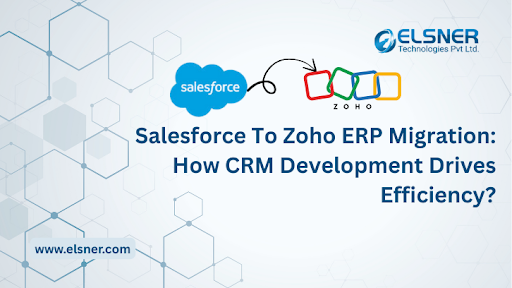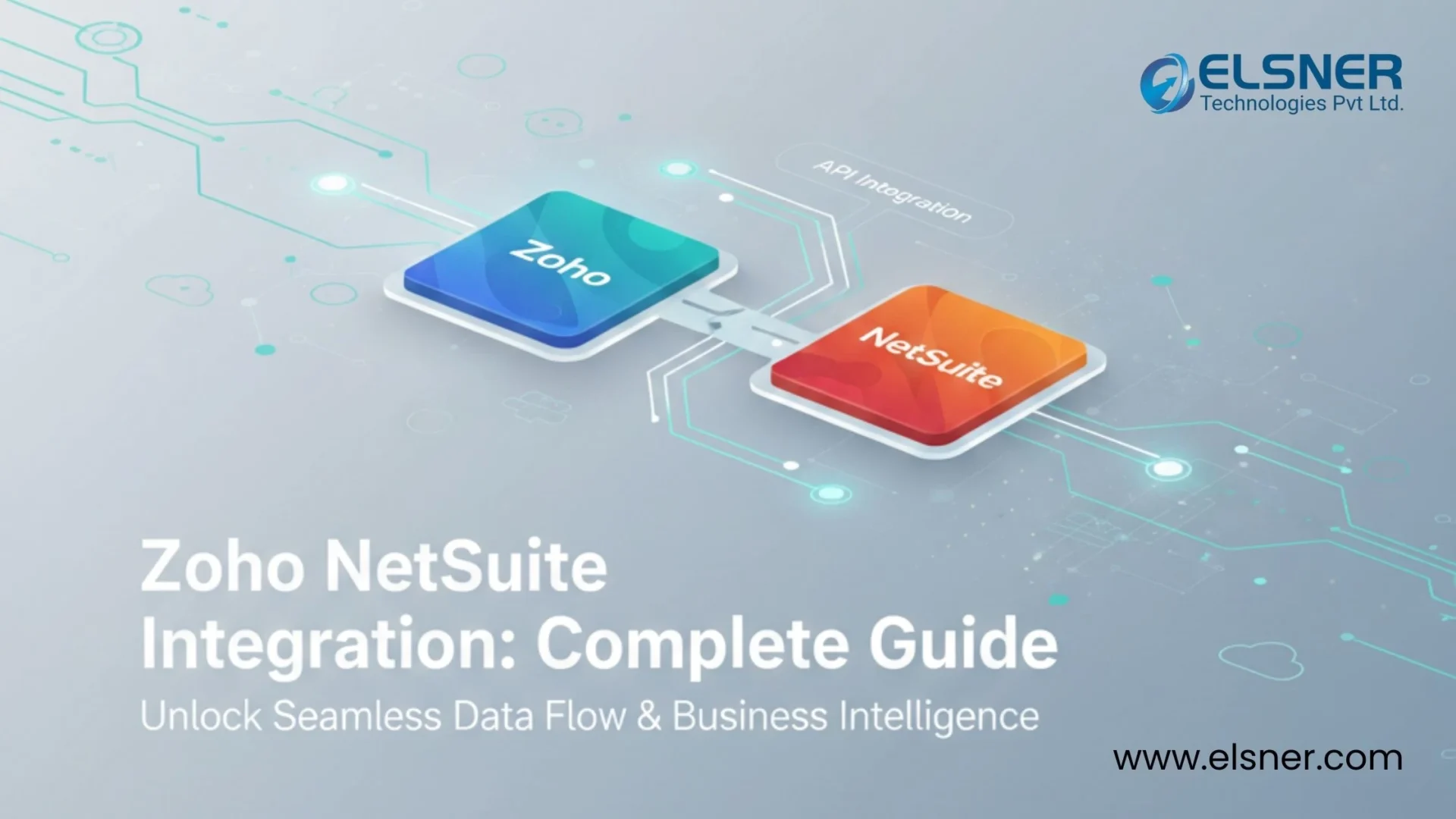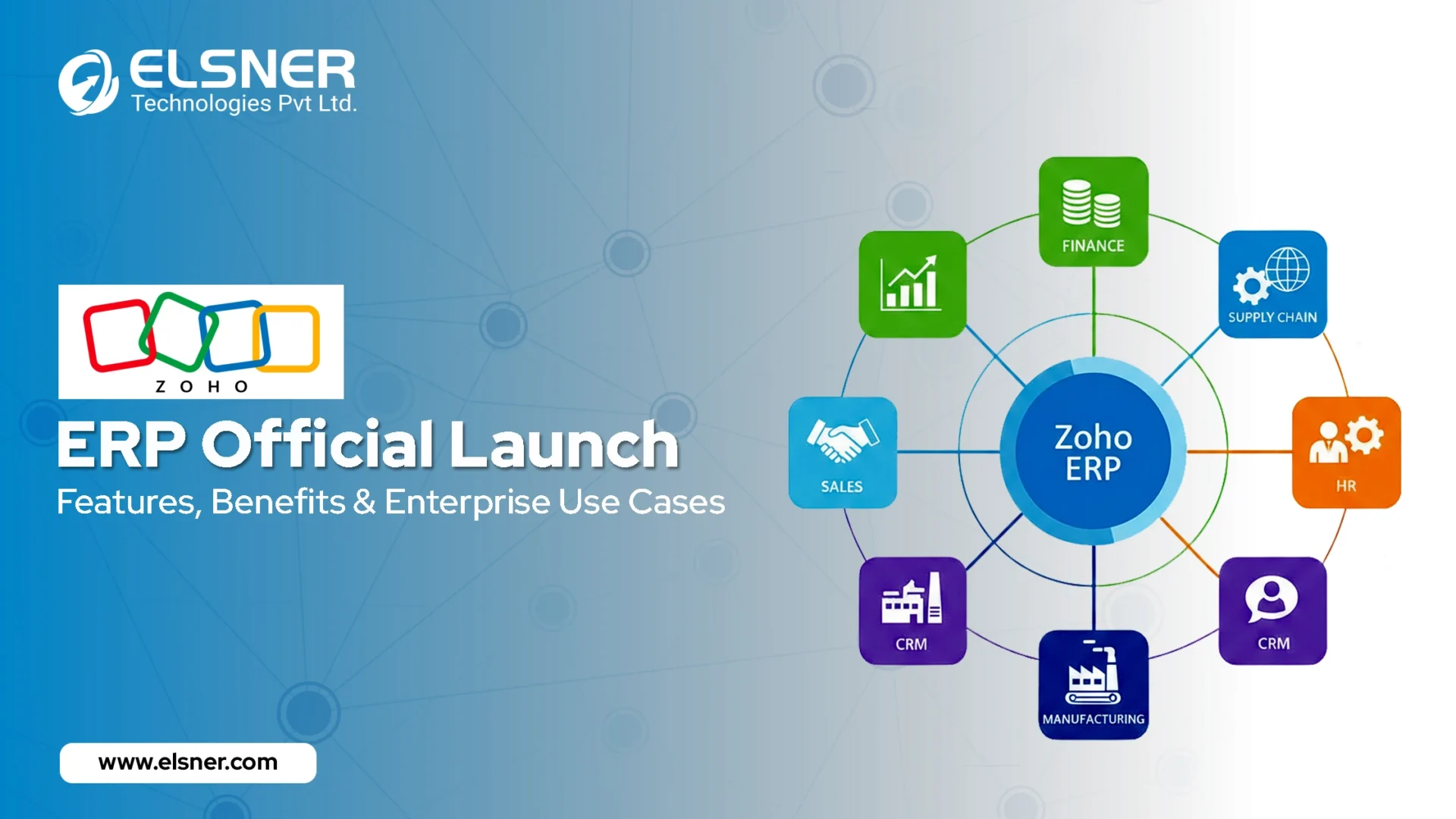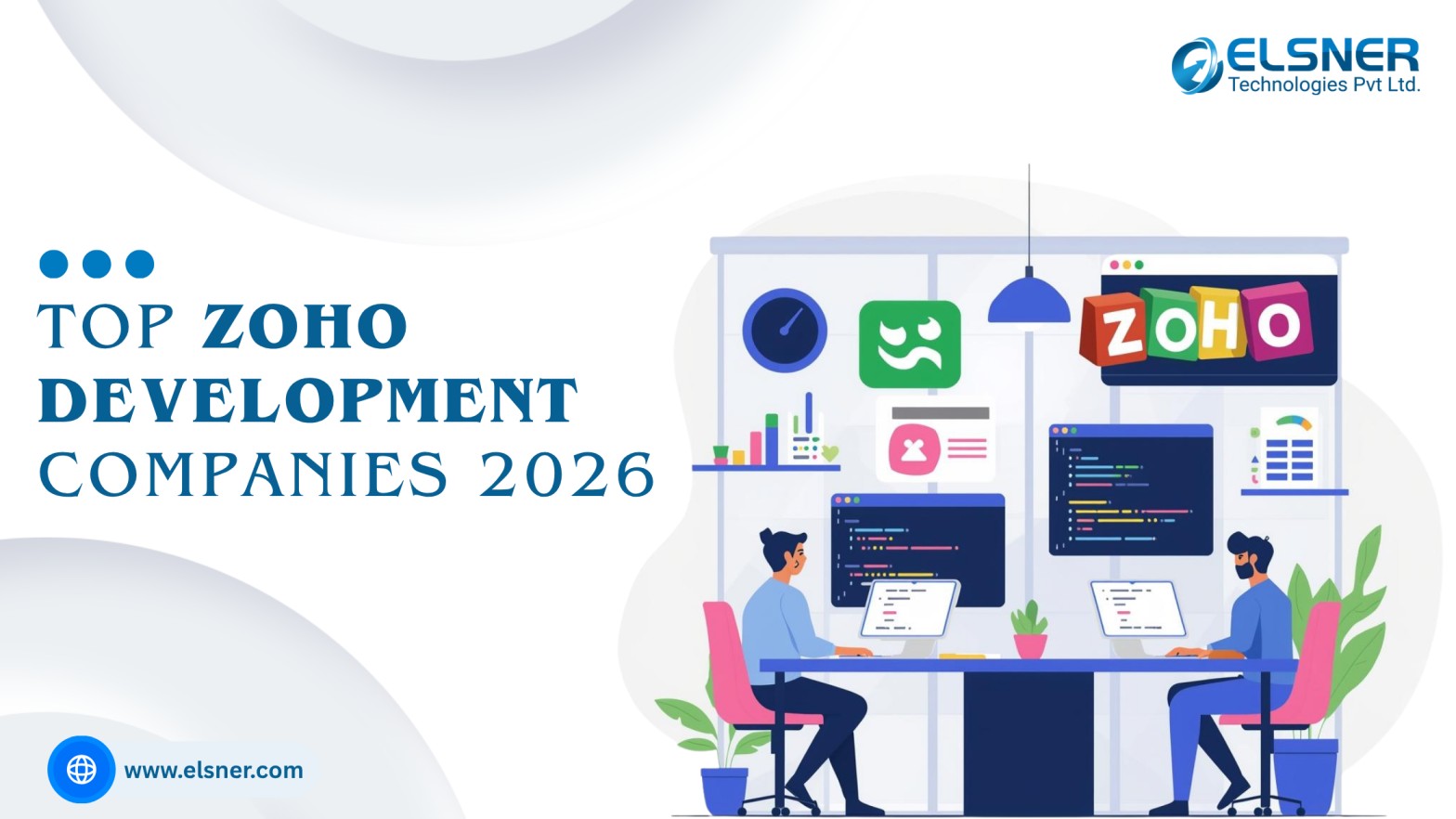- What Makes Zoho ERP a Better Fit for Manufacturing?
- What Is Involved in a Salesforce to Zoho Migration for Manufacturers?
- Why Not Just Do It Yourself?
- Example Manufacturing Migration Scenario
- Post-migration results:
- Talk to Zoho ERP Migration Experts
- How Does Zoho CRM Development Help Manufacturing Workflows?
- Steps Elsner Takes for a Smooth Migration
- What Should You Watch Out For During Migration?
- What Is the ROI of Moving from Salesforce to Zoho ERP?
- Why Elsner Is the Right Partner for USA Manufacturers?
- Final Thoughts — Moving from Salesforce to Zoho ERP in Manufacturing
- Ready to Make the Move?
- FAQs About Salesforce to Zoho ERP Migration in Manufacturing
- Q1: How do I migrate Salesforce to Zoho ERP without losing historical manufacturing data?
- Q2: What is the fastest way to migrate Salesforce to Zoho for a manufacturing company?
- Q3: Can I use Zoho CRM without replacing my current ERP system?
- Q4: How does Zoho ERP software support custom manufacturing workflows?
- Q5: Why should USA-based manufacturers migrate Salesforce to Zoho ERP?
- Q6: Does Elsner provide training after the Salesforce to Zoho ERP migration?
- Q7: How can Zoho CRM development improve manufacturing efficiency?
Salesforce has long been seen as the “go-to” for CRM. Yet, many USA-based manufacturing companies are now asking themselves is it still worth it?
According to recent insights from Capterra’s software trends research, a significant share of small- to mid-sized businesses in the United States are reconsidering their current CRM platforms in 2025 — with many actively exploring migration to more flexible and cost-effective solutions. The biggest drivers are:
- High licensing and upgrade costs
- Slow system performance with large datasets
- Overcomplicated UI for non-technical teams
- Difficulty connecting ERP with day-to-day manufacturing operations
For manufacturers, time is money. If a system slows down order tracking or delays production planning, the impact shows in missed deadlines and unhappy customers.
Zoho ERP software has been catching attention because it combines CRM, ERP, and business automation — without the eye-watering price tag.
What Makes Zoho ERP a Better Fit for Manufacturing?
If you compare ERP system Zoho to Salesforce plus a separate ERP, Zoho often comes out ahead for manufacturing-specific workflows.
|
Feature |
Salesforce + ERP Add-on |
Zoho ERP Software (with CRM) |
|
Licensing Cost (per user/year) |
$1,200+ |
$360–$480 |
|
Built-in Inventory Management |
Third-party integration |
Native module |
|
Production Scheduling |
Limited in core CRM |
Available in ERP + CRM |
|
Custom Modules |
Developer-heavy setup |
Drag-and-drop customization |
|
Manufacturing Analytics |
Requires BI tool add-on |
Built into system |
You can see — Zoho’s approach saves cost, but more importantly, it removes the friction between CRM and ERP data.
What Is Involved in a Salesforce to Zoho Migration for Manufacturers?
Moving from Salesforce to Zoho ERP is not just about transferring data. You need to protect years of records, keep processes running, and ensure your teams can use the new system from day one.
At Elsner, our Zoho consulting services cover:
- Data audit and clean-up before migration
- Mapping Salesforce modules to Zoho CRM development equivalents
- ERP module setup for manufacturing (inventory, work orders, BOM, suppliers)
- User training for shop floor and admin teams
- Post-migration support to handle adjustments
This is where many manufacturers go wrong — skipping planning or underestimating the complexity of the migration.
Why Not Just Do It Yourself?
Yes, you could attempt a DIY migration. But in manufacturing, even one day of downtime can cost thousands of dollars in missed orders or idle machines.
Professional migration support means:
- No accidental data loss during export/import
- Minimal disruption to daily operations
- ERP and CRM tuned to your workflows, not generic templates
- Issues fixed before they snowball into delays
An in-house IT team may know your processes well — but Zoho consulting services bring deep knowledge of the tools you are moving into. That is the difference between a working system and one that truly fits your production line.
Example Manufacturing Migration Scenario
Let us imagine a mid-sized precision parts manufacturer in Ohio.
They had:
- 4,800 active client accounts in Salesforce
- Custom quoting process linked to ERP for material costs
- Separate inventory tracking system for raw materials and finished goods
When they decided to migrate Salesforce to Zoho, the process included:
- Mapping quoting workflow into Zoho CRM and ERP modules
- Consolidating inventory into one ERP system Zoho environment
- Training sales teams and production managers in one week
- Migrating 3 years of order history without data loss
Post-migration results:
- Order-to-delivery time dropped by 18%
- Quoting errors fell by 42%
- Licensing costs cut by nearly $25,000 per year
This is not a case study from Elsner’s portfolio — but it reflects the kind of outcomes manufacturers in the USA can expect when migration is handled with care.
Talk to Zoho ERP Migration Experts
Switching from Salesforce? We help manufacturing companies plan, migrate, and optimize Zoho ERP for maximum productivity.
How Does Zoho CRM Development Help Manufacturing Workflows?
Zoho CRM development is not just about creating forms and dashboards — it is about connecting the sales, production, and delivery cycle into one smooth flow.
For manufacturing, that can mean:
- Automatic work order creation when a sale is confirmed
- Linking supplier data to purchase orders in ERP
- Tracking production status directly in CRM
- Real-time inventory updates for the sales team
When these elements connect, sales can promise accurate delivery dates without constantly checking with production.
Steps Elsner Takes for a Smooth Migration
Here is the process we follow for manufacturing clients moving from Salesforce to Zoho ERP:
|
Step |
What We Do |
|
1. Discovery |
Review your current Salesforce setup and ERP dependencies |
|
2. Data Preparation |
Clean and format records for migration |
|
3. Module Mapping |
Match Salesforce objects to Zoho CRM & ERP modules |
|
4. Custom Development |
Build manufacturing-specific modules & automation |
|
5. Migration |
Transfer data in batches to prevent errors |
|
6. Validation |
Test ERP + CRM workflows before go-live |
|
7. Training |
Conduct role-based training for different teams |
|
8. Support |
Provide ongoing technical help after migration |
What Should You Watch Out For During Migration?
Even with experts, migration can have pitfalls:
- Dirty data: Outdated or duplicate records slow down the process
- Process gaps: Missing workflows in Zoho can disrupt operations
- Over-customization: Too many tweaks at once can confuse users
That is why Zoho consulting services from a certified team like Elsner focus on striking the right balance between custom features and keeping it easy to use.
What Is the ROI of Moving from Salesforce to Zoho ERP?
You can measure ROI in several ways:
|
ROI Metric |
Pre-Migration |
Post-Migration |
|
Annual Licensing Cost |
$54,000 |
$21,000 |
|
Average Order Cycle |
14 days |
11.5 days |
|
Quote Accuracy |
78% |
93% |
|
Sales-Production Sync |
Manual |
Automated |
Manufacturers in the USA often see their migration cost recovered within 12–18 months.
Why Elsner Is the Right Partner for USA Manufacturers?
Elsner has helped multiple manufacturing businesses migrate from Salesforce to Zoho without downtime. Our Zoho consulting services are built on understanding both the technical and operational side of manufacturing.
We do not just move data — we make sure your Zoho CRM development and ERP system Zoho setup works for your floor managers, your sales reps, and your customers.
Final Thoughts — Moving from Salesforce to Zoho ERP in Manufacturing
Shifting from Salesforce to Zoho ERP software is more than a software change — it is a strategic decision that shapes how your manufacturing business operates every single day.
When done right, you gain a connected CRM and ERP that speak the same language, eliminate redundant tools, and cut costs without sacrificing functionality.
With Zoho consulting services and expert Zoho CRM development from Elsner, manufacturers in the USA can move with confidence — keeping production lines steady, sales teams informed, and customers satisfied.
Whether your goal is to migrate Salesforce to Zoho for budget reasons, better performance, or tighter ERP integration, the key is a migration plan that considers both technology and your people.
Now is the time to prepare your systems for the next decade — and the right partner makes that transition smoother than you might imagine.
Ready to Make the Move?
If you are a USA-based manufacturer tired of Salesforce costs or integration headaches, it may be time to explore Zoho ERP software.
Elsner can guide you through the migration — ensuring your CRM and ERP fit your production needs perfectly.
Get in touch today to see how we can help you cut costs, speed up operations, and keep your customers coming back.
FAQs About Salesforce to Zoho ERP Migration in Manufacturing
Q1: How do I migrate Salesforce to Zoho ERP without losing historical manufacturing data?
With proper data mapping and validation, you can retain 100% of usable historical data. Elsner’s Zoho consulting services ensure every critical record, from customer orders to production logs, is transferred accurately.
Q2: What is the fastest way to migrate Salesforce to Zoho for a manufacturing company?
For most manufacturers, a well-planned migration with professional support takes 6–10 weeks. Using Elsner’s proven Salesforce toZoho migration process can shorten timelines without disrupting production.
Q3: Can I use Zoho CRM without replacing my current ERP system?
Yes. You can connect Zoho CRM to your existing ERP, but the real power comes when you integrate ERP system Zoho modules for a unified, real-time view of operations.
Q4: How does Zoho ERP software support custom manufacturing workflows?
Zoho ERP software lets you create work order flows, inventory rules, quality checks, and supplier management processes — all tailored to your plant’s needs.
Q5: Why should USA-based manufacturers migrate Salesforce to Zoho ERP?
Switching to Zoho ERP software reduces licensing costs, improves data access speed, and provides flexible CRM development to match your production processes.
Q6: Does Elsner provide training after the Salesforce to Zoho ERP migration?
Yes. We provide role-based training so production teams, sales staff, and managers each learn the features relevant to their daily work.
Q7: How can Zoho CRM development improve manufacturing efficiency?
Custom Zoho CRM development can automate lead-to-order processes, sync with inventory, and give sales teams instant production status — reducing delays and errors.

About Author
Pankaj Sakariya - Delivery Manager
Pankaj is a results-driven professional with a track record of successfully managing high-impact projects. His ability to balance client expectations with operational excellence makes him an invaluable asset. Pankaj is committed to ensuring smooth delivery and exceeding client expectations, with a strong focus on quality and team collaboration.




